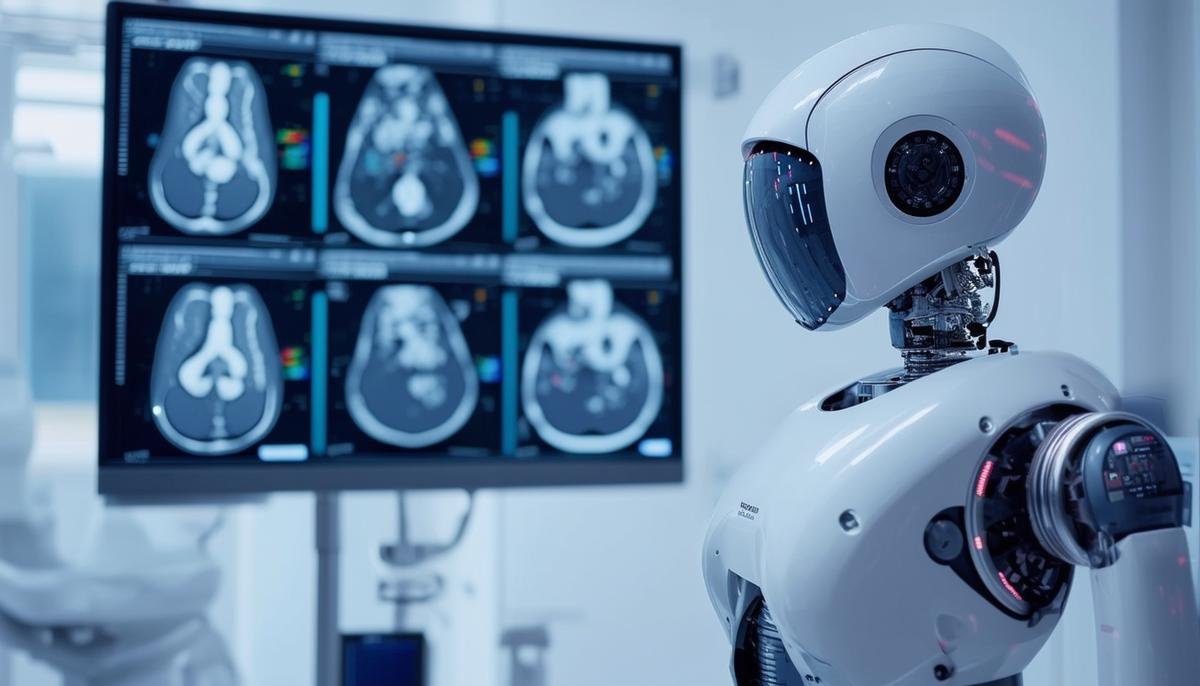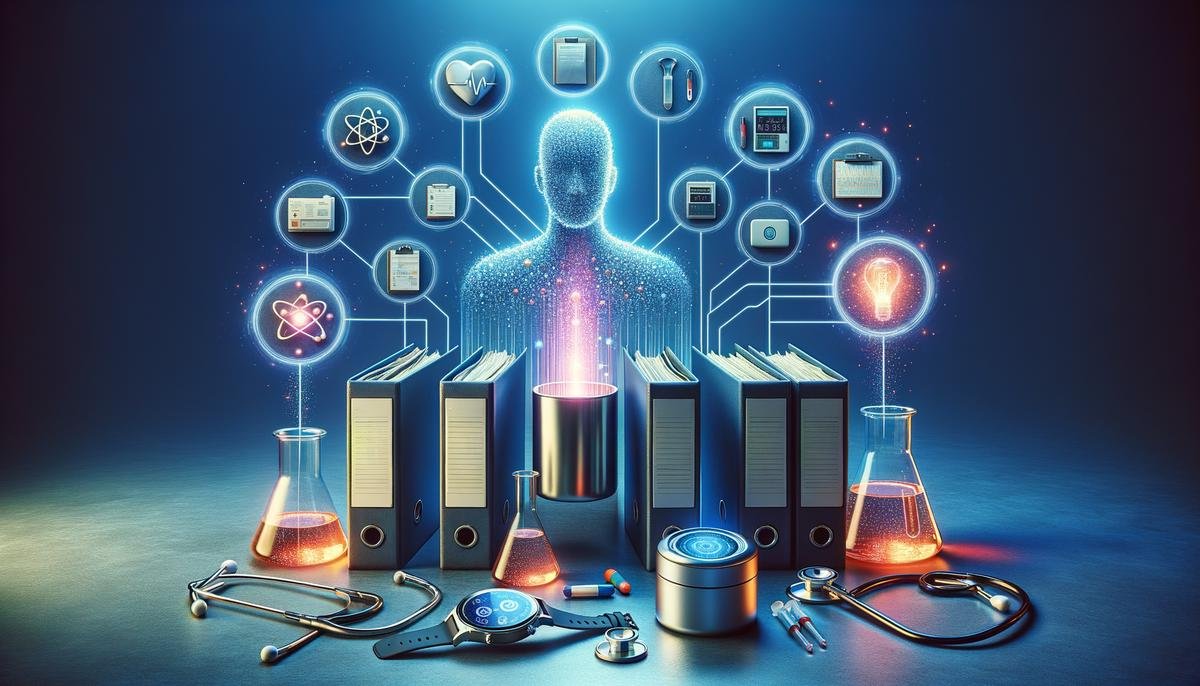Improving Diagnostic Accuracy and Speed
AGI algorithms are changing how medical diagnoses happen, sharpening accuracy and reducing the time it takes to get there. Machine learning models can detect diseases early by analyzing data like mammograms to identify breast cancer sooner than traditional methods. This leads to earlier treatment initiation, which often translates to better patient outcomes.
AGI excels at analyzing large amounts of medical data consistently. Unlike a tired doctor, an AGI system doesn't need a break and won't miss a detail. These systems can quickly sift through electronic health records, lab results, and patient histories, detecting patterns that humans might overlook. Researchers have used AGI to predict conditions like sepsis in patients, where fast response is critical.1
AGI also helps reduce diagnostic errors. While doctors' experience is valuable, it can occasionally be flawed. AGI provides another set of eyes, double-checking diagnoses and highlighting anomalies. For example, AGI can analyze chest X-rays, flagging minute details to aid in swift and accurate pneumonia diagnosis. This means less waiting, fewer misdiagnoses, and better treatment plans from the start.
By processing data in real-time, AGI improves diagnostic speed. It can reduce time-consuming tasks like analyzing MRI scans from hours to mere minutes. This efficiency ensures even minor irregularities are caught promptly, which could be life-saving in emergencies.
Wearable technology paired with AGI enables real-time monitoring of vital signs, providing immediate analysis and alerts. This is already helping manage chronic conditions like diabetes by tracking blood glucose levels, analyzing data, and notifying users before it becomes critical.
AGI is a significant advancement in medical diagnostics. From early disease detection to consistent data analysis and error reduction, AGI ensures faster, more reliable diagnoses. This technology merges human expertise with the precision of intelligent algorithms for better care and healthier patients.

Personalized Medicine and Treatment Plans
AGI is transforming healthcare through personalized medicine. Predictive analytics, a key AGI tool, analyzes vast datasets, including a patient's medical history, health metrics, and even social and environmental factors, to predict future health events. This proactive approach allows for anticipating diseases before they fully develop, enabling preemptive treatments. For instance, AGI-powered models can predict cardiovascular events by analyzing patterns and correlations, allowing doctors to intervene early and customize preventive measures to the individual's risk profile.2
Genomic analysis is another area where AGI is making strides. By examining a patient's genetic data, AGI systems can identify markers associated with specific diseases. This analysis uncovers how a patient's genetic makeup influences their reaction to medications, predicting potential adverse reactions or identifying the most effective drugs. In cancer treatment, AGI can identify genetic mutations specific to a patient's tumor, guiding oncologists to the most effective treatment protocols, improving outcomes and reducing side effects.
AGI generates highly individualized treatment plans, considering a patient's unique genetic profile, lifestyle, and existing medical conditions. These plans adjust as new data becomes available, which is a game-changer for managing chronic diseases like diabetes. Instead of a generalized regimen, AGI continuously refines approaches based on real-time health data, ensuring care is as responsive and precise as possible.
Additionally, AGI integrates real-world data from wearable devices that continuously monitor vital signs. This constant stream of information allows AGI to make real-time adjustments to treatment plans, offering a level of precision and adaptability that manual monitoring cannot match. For instance, a patient with hypertension could wear a device that monitors blood pressure throughout the day, with AGI analyzing the data and adjusting medication dosages in real-time to maintain optimal levels.
AGI's integration with personalized medicine represents a significant leap in healthcare. By harnessing predictive analytics, genomic analysis, and continuous real-time monitoring, AGI provides treatment plans customized to the individual. This means more effective treatments, minimized side effects, and care precisely attuned to patient needs. As AGI evolves, its role in enabling truly personalized medicine becomes even more transformative, heralding a future where healthcare is as unique as the patients it serves.
Enhancing Patient Engagement and Monitoring
AGI-powered tools are ushering in a new era of patient engagement and monitoring, leveraging advanced technology to provide continuous oversight and timely healthcare interventions. Wearable devices have become indispensable in monitoring patient health metrics in real-time. These smart gadgets constantly collect data on various parameters such as heart rate, blood pressure, and glucose levels. AGI systems analyze this influx of data around the clock, identifying patterns and anomalies that might indicate health risks. When irregularities are detected, the system can instantly alert both the patient and their healthcare provider, allowing for rapid intervention. This real-time monitoring is especially crucial for managing chronic conditions such as diabetes and heart diseases, where timely adjustments can prevent complications and improve outcomes.
Mobile applications integrated with AGI offer another layer of patient engagement. These apps track health metrics and provide users with actionable insights and reminders. For instance, an app can send personalized notifications reminding patients to:
- Take their medication
- Perform certain exercises
- Attend scheduled appointments
By doing so, these apps ensure adherence to treatment plans, which is often a significant challenge in chronic disease management. The AI within these apps can analyze user data to adjust these plans dynamically, ensuring they remain effective and relevant.
AI-based recognition technology further enhances patient monitoring through sophisticated analysis of data from various sources. Technologies such as facial recognition and voice analysis can assess subtle changes in a patient's condition that might precede more significant health issues. For example, changes in facial expression detected by a camera could indicate pain or distress, triggering an alert for further evaluation. Similarly, voice analysis can detect deviations in speech patterns that might suggest neurological issues or stress levels.3 These advanced recognition capabilities complement traditional monitoring methods, providing a more comprehensive picture of a patient's health.
Integrating data from these numerous sources amplifies AGI's ability to maintain a holistic and accurate view of a patient's health. Real-world data gathered from wearables and mobile apps feed into AGI systems, allowing for seamless updates to a patient's health profile. This ongoing collection and analysis ensure that any deviations from normal metrics are swiftly identified and addressed, sometimes even before the patient is aware of them.
Enhanced patient engagement driven by AGI fosters a collaborative approach to health management and empowers patients to take an active role in their care. When patients receive immediate feedback and personalized insights, they are more likely to stay committed to their health regimes. This engagement leads to better communication between patients and healthcare providers, facilitating a more responsive care environment.
AGI-powered wearable devices, mobile applications, and AI-based recognition technologies are revolutionizing patient engagement and monitoring. By providing continuous oversight, real-time alerts, and personalized health insights, these tools ensure that patients receive timely and effective care. This integration of AGI into everyday health management marks a significant step forward in proactive and personalized healthcare.

Breaking Down Data Silos and Improving Interoperability
AGI is revolutionizing healthcare by breaking down data silos and improving interoperability. Traditionally, healthcare data has been fragmented across various systems, locations, and providers, leading to inefficiencies and a disjointed patient care experience. AGI has the potential to integrate and analyze data from diverse sources, providing a comprehensive view of a patient's health and facilitating more informed and efficient decision-making.
AGI addresses the lack of seamless data exchange between different systems by enabling interoperability, which ensures that data can be exchanged and interpreted accurately across these systems. By leveraging advanced data standardization techniques, AGI can harmonize information from disparate sources, creating a unified patient profile that captures a broad spectrum of health data.
Integrating data from various sources allows AGI to perform comprehensive analyses, uncovering insights that wouldn't be visible through isolated datasets. Combining lab results, imaging data, and patient histories can help identify correlations and trends that might go unnoticed when these datasets are viewed separately. This holistic view is crucial for understanding a patient's overall health status and predicting potential health issues. AGI's ability to analyze this integrated data enables healthcare providers to make more accurate diagnoses and develop more effective treatment plans.
AGI-driven interoperability improves the efficiency of healthcare delivery by streamlining information flow. When a patient visits multiple specialists, AGI ensures that each provider has access to the latest and most complete set of patient data. This eliminates the need for repetitive tests and reduces the risk of medical errors caused by incomplete information. This leads to faster decision-making and more coordinated care, ultimately enhancing patient outcomes.
AGI also plays a pivotal role in advancing personalized medicine. By integrating genetic data, lifestyle information, and environmental factors with traditional medical records, AGI can create highly customized treatment plans. This comprehensive data analysis allows for precision medicine, where treatments are specifically designed based on an individual's unique characteristics.
The benefits of AGI in breaking down data silos extend beyond individual patient care to the larger healthcare system. By facilitating better data integration and interoperability, AGI supports large-scale medical research and public health initiatives. Researchers can access aggregated data from multiple institutions, enabling them to conduct more robust studies and develop new treatments faster. Public health authorities can use integrated data to monitor disease outbreaks, identify health trends, and implement more effective health policies.
AGI's ability to handle data privacy and security is another crucial factor in its role in improving interoperability. Ensuring patient data confidentiality is paramount, and AGI solutions incorporate advanced encryption and access control measures to protect sensitive information. By balancing data accessibility with stringent security protocols, AGI fosters trust among patients and healthcare providers, encouraging broader adoption of integrated data systems.
AGI is instrumental in breaking down data silos and improving interoperability in healthcare. By integrating and analyzing data from diverse sources, AGI provides a comprehensive view of a patient's health, facilitating more efficient and informed decision-making. The result is a more connected healthcare ecosystem where patient care is enhanced through robust data exchange, comprehensive analysis, and personalized treatment plans. As AGI continues to evolve, its impact on healthcare interoperability will only grow, paving the way for a more integrated and efficient healthcare system.4

Ethical Considerations and Challenges
The integration of AGI in healthcare brings about significant ethical considerations and challenges that must be carefully addressed to ensure responsible and equitable use. One of the foremost concerns revolves around data privacy. As AGI systems rely heavily on vast amounts of patient data to function effectively, ensuring the security and confidentiality of this data is paramount. AGI must be equipped with state-of-the-art encryption and access control technologies to protect sensitive health information from breaches. Transparent data governance frameworks are essential to build and maintain patient trust, ensuring their data is used ethically and securely.
Algorithmic bias represents another critical ethical challenge. AGI systems learn from existing data, which may contain biases reflecting historical and societal inequalities. Without careful oversight, these biases can be perpetuated or even exacerbated by AGI, leading to unfair or discriminatory outcomes in healthcare delivery. Addressing algorithmic bias requires the use of diverse and representative datasets during the training phase and continuous monitoring to identify and correct biases as they emerge.
Regulatory guidelines also play a crucial role in the ethical deployment of AGI in healthcare. Current regulatory frameworks often lag behind technological advancements, which can lead to uncertainties about the appropriate use of AGI. Clear and robust regulations are needed to guide the development, testing, and implementation of AGI systems in healthcare settings. This includes setting standards for data security, algorithmic transparency, and accountability.
Human-AI collaboration is essential to ensure that AGI is used responsibly in healthcare. While AGI offers advanced analytical capabilities, it is crucial that these tools are used to complement, not replace, human expertise. Medical decisions often require complex ethical considerations and a deep understanding of patient context, which human healthcare providers are uniquely equipped to handle. AGI can support these decisions by providing data-driven insights and recommendations, but the final judgment should remain with trained medical professionals.
As AGI systems become more integrated into daily medical practice, it is vital that healthcare workers are proficient in using and understanding these technologies. Ongoing training programs can help professionals stay updated on the latest developments, ensuring they can critically evaluate AGI recommendations and use them to effectively improve patient care.
While AGI holds tremendous potential to revolutionize healthcare, careful consideration of ethical challenges is crucial to its successful implementation. Addressing data privacy, algorithmic bias, and regulatory guidelines, and fostering human-AI collaboration are key steps in ensuring that AGI is used responsibly and ethically in healthcare. By addressing these challenges with diligence and transparency, we can harness the power of AGI to deliver superior, equitable, and personalized healthcare for all.5

- Kam HJ, Kim HY. Learning representations for the early detection of sepsis with deep neural networks. Comput Biol Med. 2017;89:248-255.
- Weng SF, Reps J, Kai J, Garibaldi JM, Qureshi N. Can machine-learning improve cardiovascular risk prediction using routine clinical data?. PLoS One. 2017;12(4):e0174944.
- Schuller BW, Batliner AM, Bergler C, et al. The INTERSPEECH 2019 Computational Paralinguistics Challenge: Styrian dialects, continuous sleepiness, baby sounds & orca activity. Proc Interspeech 2019. 2019;2378-2382.
- Hsu W, Markey MK, Wang MD. Biomedical imaging informatics in the era of precision medicine: progress, challenges, and opportunities. J Am Med Inform Assoc. 2013;20(6):1010-1013.
- Char DS, Shah NH, Magnus D. Implementing machine learning in health care – addressing ethical challenges. N Engl J Med. 2018;378(11):981-983.



